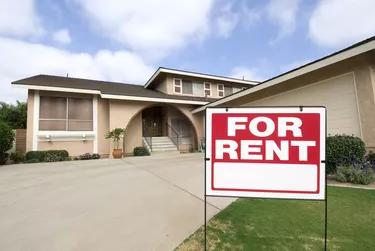
Your landlord typically can increase your rent by any amount he desires, unless your lease agreement puts a cap on the amount of an annual increase or you live in a rent-controlled area. However, in most states, your landlord must provide you with written notice of the increase either 30 or 60 days before it can take effect.
Renting With a Lease
Video of the Day
If you have a lease, many states require the lease document to specify the amount of rent you must pay and when the rent is due. The advantage of a lease for the renter is that it usually ensures a guaranteed fixed amount of rent for the lease period, and many leases also specify the amount by which the landlord can raise the rent when the lease expires. The advantage of a lease for the landlord is guaranteed income for the entire lease period. A renter typically must pay a fee if he terminates the lease before it expires.
Video of the Day
Renting Without a Lease
If you don't have a lease, you have an oral agreement. For example, if you agree to pay $500 per month, you're considered a month-to-month renter. In most states, the landlord can raise the rent by any amount at the end of each month. However, there might be specific procedures the landlord must follow to notify you that he's raising the rent. For example, in California, your landlord must provide 30 days written notice if he's raising the rent by 10 percent or less, and 60 days written notice if he's raising the rent by more than 10 percent. The notice must be delivered to you in person or mailed to you. If it's mailed to you, the landlord must add an additional five days to the 30- or 60-day period. In some cities, such as Seattle, there are both Washington state laws and local Seattle ordinances that landlords must follow to notify renters about rent increases.
Rent Control
Many large cities -- such as Newark, New York, Los Angeles, Oakland, San Francisco, San Jose and Washington -- have laws that limit the amount of rent a landlord can charge for some rental properties. These laws are usually called rent control, rent stabilization, or maximum rent regulations. The provisions often are complex and vary substantially among cities. However, in most cities a rent control board establishes the maximum rent that a landlord can charge and the amount and frequency of rent increases. When a tenant moves out, landlords usually can increase the rent to the current market level. Most rent control laws provide increased tenant protections against eviction to prevent a landlord from evicting a tenant so she can increase her rental income. Rent control laws are politically unpopular, and 32 cities have passed laws or ordinances that prohibit the practice.
Security Deposits
In many states, the maximum amount of a security deposit is equal to a multiple of your monthly rent. When your rent increases, your landlord often has the ability to demand that you pay the amount of the increase as an additional security deposit. For example, if your security deposit is equal to one month's rent and your rent increases by $50 per month, the landlord often can demand that you pay a one-time additional security deposit fee of $50.
Illegal Rent Increases
A landlord who increases rent illegally in a rent-controlled area usually faces civil and even criminal penalties, and you can report the landlord to the rent control board. In the absence of rent control, if you have a lease that guarantees a fixed amount of rent, you are within your rights to pay that amount until the lease expires. If you don't have a lease, you're within your rights to pay your current rent until the landlord has provided you with either 30 or 60 days written notice of the rent increase. There usually aren't any penalties for a landlord who tries to increase the rent illegally outside of a rent-controlled area.
How to Respond to an Illegal Rent Increase
While you can decide not to pay an illegal rent increase until your lease expires or until the landlord has given you proper notice, your landlord also can decide to evict you if you haven't followed the terms of your lease. For example, if you're often late paying your rent, or your girlfriend moves in and is not on the lease, your landlord might have legal grounds for eviction. Decide whether it's in your best interest to exercise your right not to pay the additional rent until the landlord has given you proper notice. In any case, obtain a letter from the landlord that specifies the amount of the rent increase. If you can't get a letter from the landlord, write the landlord a letter of understanding that confirms the amount of the rent increase.
Communicating With Your Landlord
The best course of action when you face a rent increase usually is to talk to your landlord in person. If you can convince the landlord that you might have to move because of the rent increase and you've been a good, long-term tenant, the landlord might forego or reduce the increase to avoid having a vacant unit and spending money to prepare your unit to be rented by someone else. If the rent increase affects every tenant in your building, you might collectively be able to convince the landlord that increasing the rent is a bad idea because it will result in more than one vacancy.